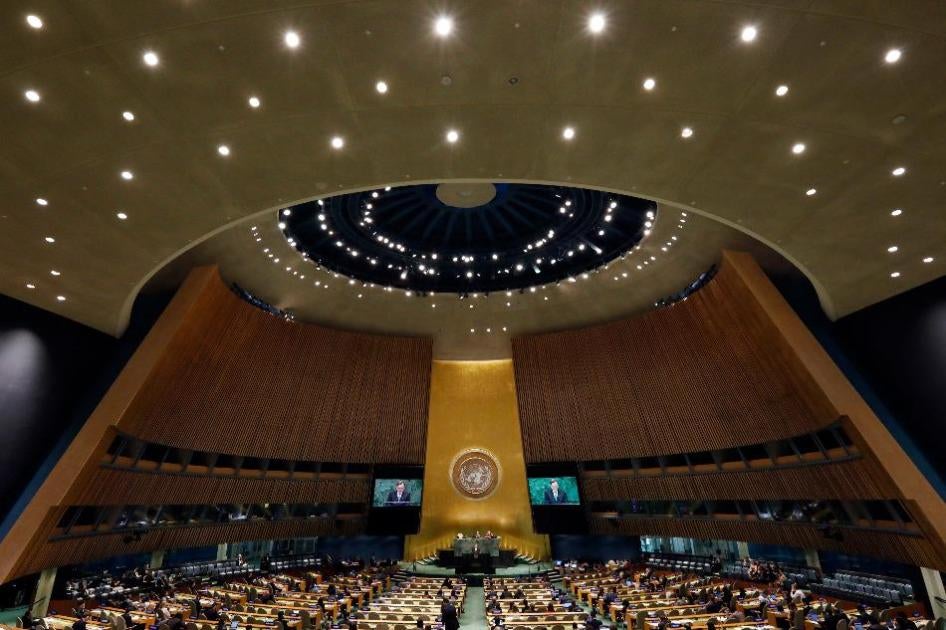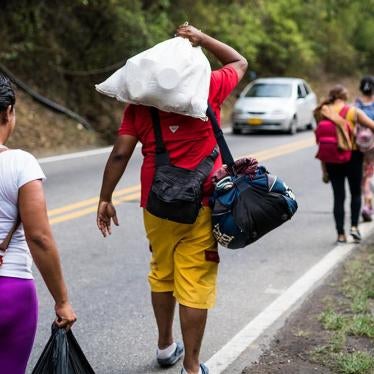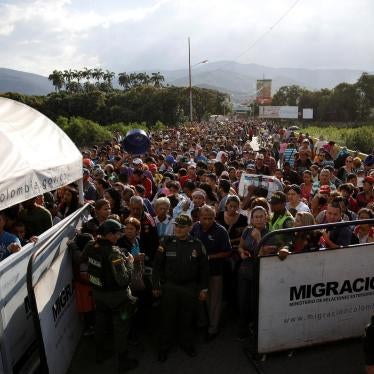(New York) – Several candidates vying for seats on the United Nations Human Rights Council have problematic rights records, and UN member states should not vote for Venezuela. Venezuela’s abusive government clearly falls short of minimum standards for membership.
On October 17, 2019, the UN General Assembly will elect 14 new members to the 47-nation council for a three-year term beginning in January 2020. The Latin American and Caribbean regional group at the UN had initially put forward only two candidates for two council seats – Venezuela and Brazil, virtually assuring both of victory. But on October 3, Costa Rica, which has a solid human rights record, announced it would compete for a seat. That means the 193 assembly members can deny a seat to Venezuela’s abusive government.
“Now that UN member states have a choice, there is no possible excuse to vote for Venezuela,” said Louis Charbonneau, UN director at Human Rights Watch. “A vote for Venezuela is a vote for the torture, murder, and impunity that have become trademarks of President Nicolás Maduro’s government. It’s a slap in the face to the millions who have fled the country, many facing dire humanitarian conditions, and the countless victims who never made it out.”
Fifty-four international and Venezuelan organizations, including Human Rights Watch, declared Venezuela unfit for council membership on October 10. In September, the council passed a resolution establishing an independent fact-finding mission to investigate allegations of extrajudicial executions, enforced disappearances, arbitrary arrests, torture, and other cruel or degrading treatment committed in Venezuela since 2014. Venezuela rejected that resolution.
UN General Assembly Resolution 60/251, which created the Human Rights Council, urges states voting for members to “take into account the contribution of candidates to the promotion and protection of human rights.” This applies to their efforts to promote and protect human rights at home and abroad. Council members are required to “uphold the highest standards in the promotion and protection of human rights” and “fully cooperate with the Council.”
Venezuela does not meet those minimum standards, Human Rights Watch said. More than 4 million Venezuelans have fled the country to escape the humanitarian emergency, and the political, economic, and human rights crisis.
Two of the five UN geographical regions have no competition for council seats, meaning that their candidates’ victory is largely a foregone conclusion in the secret ballot. Four African countries are running for four seats: Benin, Libya, Mauritania, and Sudan. The Netherlands and Germany are seeking the two available Western group seats.
The Eastern Europe and Asia groups allowed for competition, with Armenia, Moldova, and Poland vying for two seats, and Indonesia, Iraq, Japan, Marshall Islands, and South Korea competing for four spots.
All regions should ensure that they offer competitive slates, enabling UN members to deny seats to the most abusive governments. In 2016, Russia lost its Human Rights Council re-election bid by two votes following outrage over the bombardment of civilians in Aleppo, Syria. A lack of competition undermines membership standards.
The third Latin American/Caribbean candidate is Brazil, whose president, Jair Bolsonaro, has embraced rhetoric hostile to human rights norms. His government has effectively given a green light to criminal networks destroying the Amazon rainforest and attacking forest defenders. Chronic human rights problems plague Brazil, including police violence. But while Venezuela has routinely sought to frustrate the council’s ability to address abuses, Brazil has supported numerous council resolutions tackling a range of violations around the world.
Poland has systematically eroded the independence and effective functioning of its judiciary. In recent years, judges and prosecutors have been subject to arbitrary disciplinary proceedings for speaking out on judicial reforms, an interference with judicial independence.
In Indonesia, there has been a rise in religious intolerance that has led to discrimination against religious minorities, women, and LGBT people. The Indonesian government tolerated the use of hundreds of discriminatory regulations, including the blasphemy law, to prosecute minorities. In Iraq, the government has yet to ensure that all forces, including Islamic State (also known as ISIS) suspects, that may have committed war crimes, crimes against humanity, or genocide, are held to account for specific crimes. Iraqi security forces continue to commit abuses, killing over 100 protesters in early October after resorting to excessive and lethal force at demonstrations.
Sudan has a long history of human rights abuses and impunity for grave crimes. If it joins the Human Rights Council, the new transitional government should set an example on human rights promotion by taking concrete steps toward accountability and reforms. This should include carrying out credible investigations into attacks on protesters since December 18 and surrendering ousted President Omar al-Bashir to the International Criminal Court.
In Mauritania, authorities have used laws on criminal defamation, spreading “false information,” and blasphemy to prosecute and jail human rights activists, bloggers, and political dissidents.
The council was created in 2006 to replace the Commission on Human Rights, whose credibility had been shattered because it included countries with records of serious human rights violations.
“UN member states shouldn’t reward abusive governments with seats on important bodies like the Human Rights Council,” said Charbonneau. “No government is perfect, but Venezuela would clearly join the council with a view to protecting itself and its allies from legitimate criticism. When member states mark their ballots, they should make defeating Venezuela a priority.”








